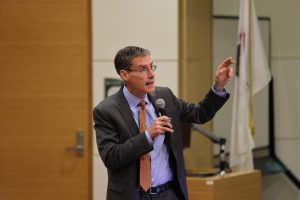An epidemic of a genetic condition?
World renowned Dr. William Walsh delves into the mysteries of Autism
September 30, 2015
William Walsh PhD, FACN visited College of DuPage on Sept. 23 as a guest speaker in the Autism Expert Speaker Series, hosted by the Autismeria club. Walsh gave an in-depth presentation on his own research and findings, therapies, stories of success, and theories on some of the many mysteries of autism.
Professionals and families of those diagnosed with autism packed themselves into SRC 2000 to hear Walsh’s controversial yet evidence-based theories. Concerned and invested individuals eagerly asked questions and took down notes, afraid to miss anything that could potentially help their loved ones.
In attendance to hear Walsh speak was Nancy Evans, whose son has been previously diagnosed with autism. Evans, however, is skeptical of the diagnosis and wanted an expert’s insight on the potentially life altering disorder.
“I came to hear Dr. Walsh speak because I needed some answers and guidance, and I want to do everything I can to help my son,” Evans stated. “This presentation was very enlightening. When Dr. Walsh said that of all the patients diagnosed with Autism, 25 percent are actually misdiagnosed and have something completely different, you know, my first thought was that there is hope.”
In his presentation, Walsh revealed his theories on how it is possible for a disorder such as autism, that is genetic, to grow at a rate comparable to an epidemic. Oxidative stress, a harmful condition in which free radicals exceed the body’s antioxidant defenses, is one of the leading causes his research has found. For this reason, Walsh explains, many autism therapies have antioxidant properties.
“Since DNA mutations take centuries to develop, the autism epidemic has been attributed to the changes in the environment, including but not limited to mercury exposures, vaccines, changes in diet, viruses, and increased copper in the water supply.”
Matthew Duckworth, a former College of DuPage student, was diagnosed with those very imbalances as a child, but has made significant recovery through the use of therapies and treatments.
“I was diagnosed with a copper and zinc imbalance as a child, and received treatments for it from the age of six up until I was around 20. It has been a total turn around.” Duckworth goes on to say how he is getting married and living a much better life after treatment.
As the president and founder of the Naperville based Walsh Research Institute, Walsh is an internationally recognized expert and scientist in the field of nutritional medicine. He is also the author of “Nutrient Power: Heal Your Biochemistry and Heal Your Brain,” in which he describes his evidence-based nutrient therapy system. He has helped treat roughly 6,500 autistic patients; one of the highest numbers of autistic patients to ever be clinically treated by one doctor.
Walsh explained that of the thousands of autism patients he has clinically assessed, nearly all of them have striking biochemical imbalances; more so than that of patients with depression, bipolar disorder, and schizophrenia.
“The autism chemical imbalances are actually more severe than any other disorder we’ve looked at.” Walsh goes on, however, to say that the disorder is definitely treatable and potentially preventable. He believes that with the identification of the misbehaving genes in those with autism, the future may represent a superior therapy for patients.


















